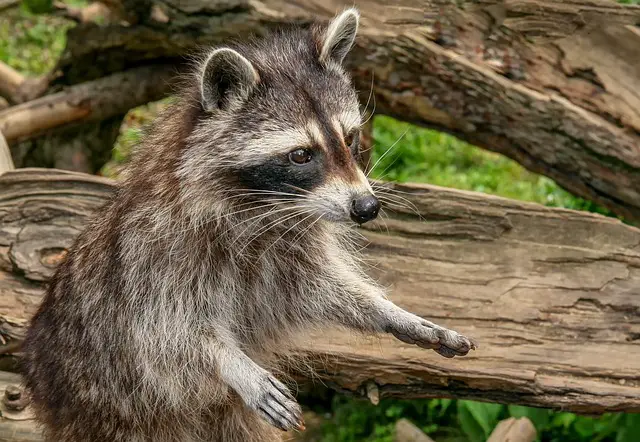Have you ever wondered just how far away raccoons can smell food? Well, get ready to be amazed because today I’m diving into the fascinating topic of raccoon olfactory abilities. As someone who has had a few encounters with these mischievous critters, I can’t help but be curious about their incredible sense of smell.
Raccoons can smell food from distances ranging anywhere from a few hundred meters to over a kilometer away. Their exceptional sense of smell allows them to detect and track the tantalizing aroma of food with impressive accuracy.
Join me as I uncover the secrets behind the remarkable olfactory powers of raccoons and discover just how far they can detect the tantalizing aroma of food. Get ready for a wild ride filled with intriguing facts and anecdotes about these resourceful creatures. Let’s jump right in!
Understanding the Sense of Smell in Raccoons
When it comes to the sense of smell, raccoons have quite an advantage over us humans. Take a moment to picture their cute little noses – they’re not just for show! Raccoons have well-developed olfactory systems that allow them to sniff out food with remarkable precision.
- Shape and size: The nose of a raccoon is small and pointed, which helps them navigate their environment and detect scents efficiently. While it may not look as prominent as a bloodhound’s snout, don’t let its size fool you – it packs quite a punch in terms of scent detection.
- Nostrils and nasal cavity: Raccoons have two nostrils located at the end of their snouts, just like us. However, what sets them apart is their highly sensitive nasal cavity. Inside, they possess a complex network of scent receptors that pick up even the faintest odor molecules in the air. These receptors are far more numerous than those found in humans, giving raccoons an extraordinary olfactory advantage.
The science behind a raccoon’s sense of smell
Now that we know about the physical aspects of a raccoon’s nose, let’s delve into the science behind its impressive sense of smell.
- Scent receptors and the brain: The key to a raccoon’s keen sense of smell lies in its scent receptors. These receptors line the inside of their nasal cavity, and when stimulated by odor molecules, they send signals to the brain for interpretation. Interestingly, raccoons possess up to 40 times more scent receptors than humans do! This abundance of receptors allows them to detect a wide range of scents and distinguish between various odors with incredible accuracy.
- Heightened sensitivity: Imagine catching a whiff of a delicious meal cooking in the kitchen from the other side of the house. Well, raccoons can do something even more impressive! Their olfactory system is exceptionally sensitive, enabling them to detect scents that are incredibly diluted or distant. This heightened sensitivity comes in handy when they’re searching for food over long distances or even when tracking prey.
So, the next time you see a raccoon sniffing the air with those adorable noses, remember that they possess an incredible sense of smell that far surpasses our own. Stay tuned as I explore just how far these little foragers can detect the mouthwatering aroma of food.
The Range of a Raccoon’s Sense of Smell
Now that you understand the basics of a raccoon’s sense of smell, let’s explore the factors that can influence the range at which they can detect odors.
- Weather conditions: Weather plays a significant role in how far a raccoon can smell food. On a calm and clear day, with minimal wind and no rain, their sense of smell can reach greater distances. However, strong winds can disperse odors and make it more challenging for raccoons to pinpoint the exact location of food.
- Wind direction: The direction of the wind is crucial for a raccoon’s olfactory abilities. If the wind carries the scent directly towards them, they can detect food from greater distances. Conversely, if the wind blows in the opposite direction, it may hinder their ability to detect odors, especially if the scent is faint.
- Type of food: The type of food also plays a role in the range of a raccoon’s sense of smell. Strong-smelling foods, such as fish or meat, can be detected from greater distances compared to milder odors. Raccoons have a diverse diet, so their ability to detect various scents allows them to locate a wide range of potential food sources.
Estimating the range
Determining the exact range at which raccoons can smell food can be a challenging task. The range can vary depending on several factors, as mentioned above. While precise measurements are difficult to obtain, studies have provided some estimates.
- Scientific studies: Researchers have conducted studies to gain insights into the olfactory capabilities of raccoons. These studies have indicated that raccoons can detect food odors from distances ranging anywhere from a few hundred meters to over a kilometer away. However, it’s important to note that these measurements can vary based on the specific circumstances and conditions of the study.
- Considering multiple factors: To estimate the range more accurately, it’s essential to consider a combination of factors such as weather conditions, wind direction, and the type of food being detected. By taking these variables into account, we can get a better understanding of the potential range within which raccoons can smell food.
While the exact range of a raccoon’s sense of smell may be difficult to pinpoint precisely, there’s no doubt that it extends far beyond our human capabilities. These resourceful creatures have evolved with an incredible olfactory prowess, allowing them to detect the enticing scent of food from impressive distances.
In the next section, I’ll explore how raccoons use their exceptional sense of smell to track down their next meal.
How Raccoons Track Food
One of the fascinating ways raccoons track food is by following scent trails left by other animals or food sources. When an animal or object comes into contact with the ground or surfaces, it leaves behind scent molecules that raccoons can detect and follow.
- Scent marking: Raccoons have their own unique way of marking their territory and communicating with other raccoons. They use scent glands located on their feet to leave behind small amounts of scent as they walk. This scent acts as a trail for other raccoons to follow, leading them to potential food sources.
- Utilizing urine and feces: Raccoons also use urine and feces as a form of scent marking. By strategically placing their waste in specific areas, they create a scent trail that can guide them back to a food source or help them communicate with other raccoons in the area.
Raccoons are good trackers but you can also become a good raccoon tracker with tool night-vision cameras.
Detecting food from a distance
Raccoons don’t solely rely on following scent trails when it comes to finding food. Their exceptional sense of smell enables them to detect food even when it’s not in their immediate vicinity.
- Garbage cans and dumpsters: Raccoons have become notorious for their ability to sniff out food in human-populated areas. They can detect the scent of discarded food coming from garbage cans or dumpsters, even from a considerable distance. Their keen sense of smell allows them to identify potential food sources and navigate their way to these tempting treasures.
- Outdoor grills and gardens: If you’ve ever had a raccoon pay a visit to your backyard, you might have wondered how they found your outdoor grill or vegetable garden. Well, their sense of smell is the key! Raccoons can pick up the scent of food remnants on grills or the aroma of ripe fruits and vegetables in gardens. This enables them to locate these food sources and indulge in a meal fit for a furry forager.
See the best raccoon-proof garbage cans on Amazon.
Can raccoons smell unopened food?
Yes, raccoons have a remarkable sense of smell that allows them to detect unopened food. Even if food is sealed or unopened, it can still emit odors that raccoons can pick up on. Their sensitive noses can detect the scent of food through packaging or containers, especially if the smell is strong or enticing. Raccoons are known for their scavenging abilities and can often detect unopened food items, such as snacks or leftovers, which might attract their attention. It’s important to secure and properly store food to prevent raccoons from being tempted to investigate.
Raccoons’ ability to track food through scent trails and detect food from a distance is truly remarkable. Their resourcefulness and adaptability to both natural and urban environments make them skilled hunters in their quest for nourishment.
Interesting Facts about Raccoon’s Sense of Smell
Prepare to be amazed by some captivating facts about the sensitivity of a raccoon’s sense of smell. Their olfactory capabilities are truly astonishing!
- Heightened sensitivity compared to humans: Raccoons possess a sense of smell that is far more sensitive than ours. While humans have approximately 5 million scent receptors, raccoons boast an impressive 40 to 50 million! This heightened sensitivity allows them to detect and differentiate a wide range of scents, helping them navigate their environment and locate food sources with remarkable accuracy.
- Detecting odors at extremely low concentrations: Raccoons can detect odors at incredibly low concentrations, sometimes as diluted as one part per million. This means they can pick up scents that are barely discernible to our noses. It’s like having a superpowered sniffer that can unravel a world of smells we may never even notice.
Adaptation to urban environments
One of the reasons raccoons have been successful in urban environments is their ability to make use of their exceptional sense of smell. Here are some intriguing facts about their adaptability in urban settings:
- Navigating complex scent landscapes: In urban areas, raccoons encounter a diverse array of smells, from human food waste to various other odors present in the environment. Despite the complexity of these scent landscapes, raccoons can effectively navigate and distinguish between different scents to find food sources amidst the urban jungle.
- Exploiting human-related food sources: Raccoons have become adept at taking advantage of human-provided food sources, such as garbage cans, dumpsters, and even pet food left outdoors. Their highly developed sense of smell allows them to sniff out these opportunities, making them notorious for their scavenging abilities in urban neighborhoods.
- Adapting for survival: Raccoons’ resourcefulness and adaptability have played a significant role in their success in urban environments. By capitalizing on their keen sense of smell, they have been able to thrive alongside humans and find sustenance amidst the hustle and bustle of city life.
These remarkable facts about raccoons’ sense of smell remind us of their incredible abilities and their impressive adaptation to diverse habitats.
Will a Porch Light Really Keep Raccoons Away? Here’s The Truth About Porch Lights
Conclusion
In conclusion, the incredible olfactory abilities of raccoons never cease to astound. These resourceful creatures can detect food scents from distances spanning hundreds of meters to over a kilometer away. Their remarkable sense of smell allows them to navigate their environment, follow scent trails, and exploit various food sources.
As I conclude this raccoon odyssey, let’s remember to appreciate the remarkable abilities of these intelligent creatures while also being mindful of securing our own food sources. It’s important to find a balance that allows both humans and raccoons to coexist harmoniously in our shared habitats.
So, the next time you catch a whiff of a raccoon’s mischievous presence, remember their extraordinary knack for sniffing out delicious treats from afar. It’s a testament to the amazing adaptations of these clever critters and their unwavering determination to satisfy their hunger.
Until our next wildlife adventure, keep your noses sharp and your curiosity alive! Happy exploring, my friends!
Related: What Scent Will Keep Raccoons Away?









